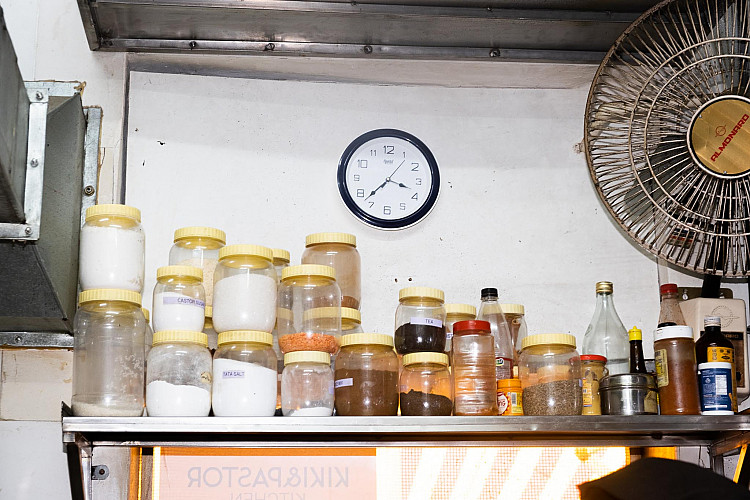[ad_1]
Wine & Dine
Text and Photography by Mallika Chandra.

I wasn’t always this keenly observant of the food being eaten at my parents’ home from a cultural perspective. But that changed in early 2021 when I left Mumbai to live on my partner’s farm in Gujarat. This meant that each time I visited the city, I found myself observing, with a unique insider-outsider view, the alterations in my family’s eating habits while also being more attuned to the city’s shifting food culture at large.
Most of our food has always been cooked at home, and on weekends, we often ate out or ordered in. During the pandemic-induced lockdown, our meals swung from simple cut fruit and one-pot dinners to extravagant feasts on special occasions depending on our morale that day. As restrictions eased, we’d step out (masked) to indulge in artisanal coffee and baked goods, in order to support our favourite cafes and bakeries. The memory of picking up a choice of brews from Kala Ghoda Cafe for our first socially distanced gathering with family friends after lockdown is as fresh as the croissants bought from Kitchen Garden By Suzette to go with it.
After a complete washout of a year in 2020, many restaurants found themselves overbooked when 2021 became the year of “revenge dining”. By 2022, eateries were so full that I remember struggling to make reservations even on weekdays. Food writer and friend, Sneha Mehta, describes her memory of that time: “Dining was not just about the act…but also marked a broader societal craving that needed fulfilling.” While away at the farm, I’d keep up with new restaurant openings via Instagram and sample a few on each visit.
I soon started noticing the diversity of take-out containers in our fridge from various meals ordered in. It became ritualistic for my sister to pop her head into my bedroom and offer me first dibs of the night’s leftovers, for lunch. Was I hungry enough to “polish off” the prawn dumplings with burnt garlic fried rice or would one-and-a-half slices of pepperoni pizza satiate me? While I enjoyed all of these, what struck me most about the food was that it was of an unexpectedly high quality, devoid of the greasy pools of oil and thus minus the regrets that, until now, had often followed meals that were ordered in. I started visiting home with a list of places to order from, rather than to eat out at.
By far, the thing that drew me towards a majority of the cloud kitchens that I soon grew to frequently order from is that they are chef-driven. Not only do they put a face to an otherwise obscure operation on their social media platforms — cloud kitchens were originally called dark kitchens or ghost kitchens for a reason — but they also intentionally convey the strong set of values that they are driven by. Chefs Anushka Malkani and Nariman Abdygapparov of Masa Bakery in Juhu have actively shared their pride in sourcing organic ingredients from within India and creatively reducing food wastage. Chef Rehan Mehta of the Colaba-based East 7th Pizza & Deli advocates for a better work-life balance for his employees when listing job opportunities. In both cases, they offer cleaner versions of notoriously indulgent foods.
Chef Kartikeya Ratan and her partner Rishabh Doshi of Bandra-based Kiki & Pastor resisted the old habit that establishments have of dousing dishes with yellow cheese sauce to make way for a more authentic take on Mexican food. Interestingly, they prioritise freshness over authenticity any day. Chef Kunal Makhija of Mahim-based Arabisque values freshness too — the hummus is made in small batches throughout the day and all his breads are freshly baked to order. Chef Divesh Aswani started Commis Station at Mahim with the idea of providing foods that are complicated or time-consuming to make — like fresh pasta or perfectly fermented kimchi — thus bringing a chef-level quality and flavour into home-cooked meals.
Focusing on flavour and knowing that people feel good while eating their food is important to them. Ratan makes no claims about specialising in Mexican food; she loves eating it with friends and that is the format she presents it in. Mehta named his company Very Casual Foods in defiance of fine dining. Makhija is purposeful about maintaining an open channel of communication and setting expectations with his customers in order to get constructive feedback.
Keeping up with the demand for delicious food that not only provides a sense of comfort but also satisfies the growing concern around eating better comes naturally to this new crop of chef-driven cloud kitchens. Each of them has figured out how to give their clientele exactly what they want in a wholesome manner.
Verve speaks to these young culinary talents about their enterprises.
At the links below, read how these chef-owners are changing the perception around cloud kitchens in Mumbai.
Kunal Makhija, Arabisque
Rehan Mehta, East 7th Pizza & Deli
Kartikeya Ratan & Rishabh Doshi, Kiki & Pastor
Divesh Aswani, Commis Station
Anushka Malkani and Nariman Abdygapparov, Masa Bakery
[ad_2]
Prafull Patil